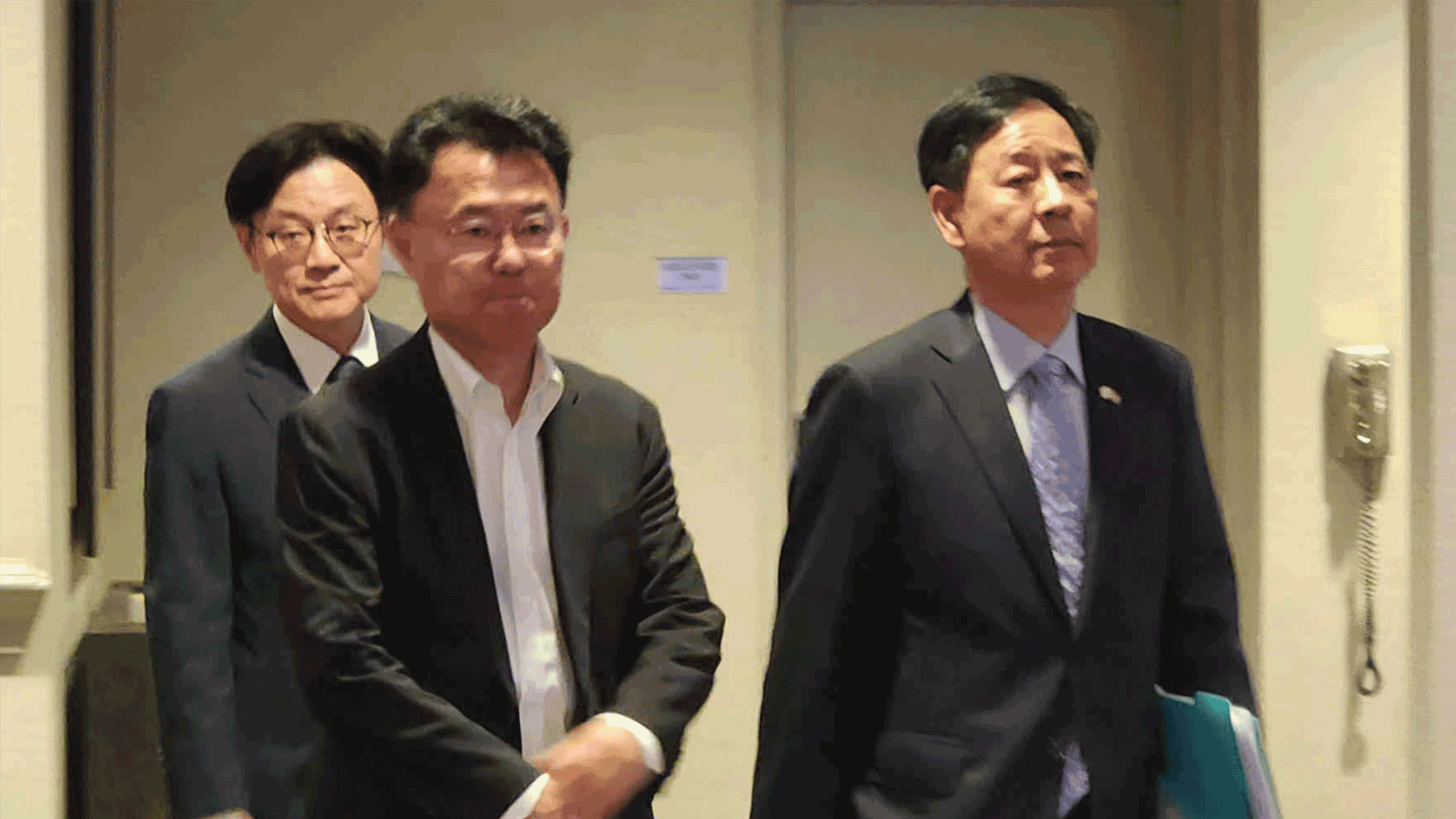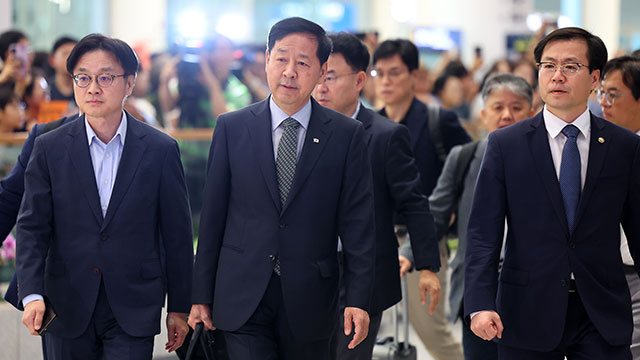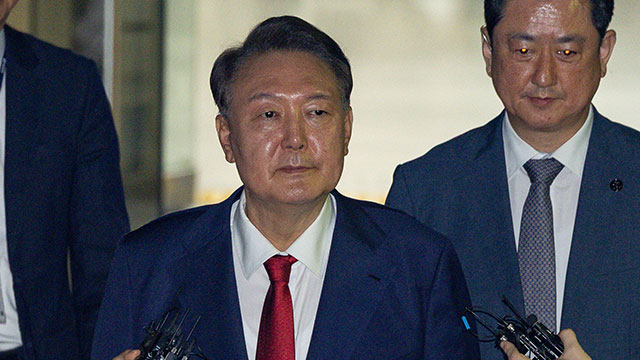[Anchor]
The Korea-U.S. tariff negotiations were concluded last night.
The reciprocal tariffs, which were at 25%, have been lowered to 15%, the same level as Japan and the European Union.
In return, we promised to invest $350 billion in the United States.
We will provide a detailed report on the results of the tariff negotiations today (July 31).
First, we have reporter Lee Hee-yeon.
[Report]
Before the meeting of the finance heads of Korea and the U.S., which was expected to be a last-minute negotiation, U.S. President Donald Trump met with our government’s negotiation team.
The news of reaching a complete agreement with our country was first shared through social media.
The reciprocal tariffs, which were set to be imposed starting from the 1st of next month at 25%, have been decided to be 15%, and the tariffs on our main export item, automobiles, have also been set at 15%.
It was also specified that tariffs on semiconductors and pharmaceuticals would be treated with most-favored-nation status to ensure they are not disadvantaged compared to other countries.
The establishment of a large-scale investment fund worth $350 billion was effective in reaching this agreement.
The shipbuilding cooperation fund, which the U.S. showed great interest in, amounts to $150 billion, while the investment fund for semiconductors and secondary batteries is $200 billion.
[Kim Yong-beom/Head of the Presidential Office Policy Office: "To minimize the risks associated with fund management, the U.S. government has agreed to take responsibility for the outputs from the projects."]
Through a large-scale investment satisfactory to the U.S., we were able to avoid further opening of out agricultural and livestock markets, which had been under pressure.
[Kim Yong-beom/Head of the Presidential Office Policy Office: "Considering food security and the sensitivity of our agriculture, we agreed not to further open the domestic rice and beef markets."]
President Lee Jae Myung evaluated through social media immediately after the negotiation was concluded, stating, "This negotiation has eliminated uncertainties in the export environment and created conditions to compete on equal or superior terms with major countries."
Our government also presented a plan to purchase U.S. energy worth up to $100 billion over the next four years to lower tariffs, which is analyzed to have been a factor in persuading President Trump, who prefers straightforward numbers.
KBS News, Lee Hee-yeon.
The Korea-U.S. tariff negotiations were concluded last night.
The reciprocal tariffs, which were at 25%, have been lowered to 15%, the same level as Japan and the European Union.
In return, we promised to invest $350 billion in the United States.
We will provide a detailed report on the results of the tariff negotiations today (July 31).
First, we have reporter Lee Hee-yeon.
[Report]
Before the meeting of the finance heads of Korea and the U.S., which was expected to be a last-minute negotiation, U.S. President Donald Trump met with our government’s negotiation team.
The news of reaching a complete agreement with our country was first shared through social media.
The reciprocal tariffs, which were set to be imposed starting from the 1st of next month at 25%, have been decided to be 15%, and the tariffs on our main export item, automobiles, have also been set at 15%.
It was also specified that tariffs on semiconductors and pharmaceuticals would be treated with most-favored-nation status to ensure they are not disadvantaged compared to other countries.
The establishment of a large-scale investment fund worth $350 billion was effective in reaching this agreement.
The shipbuilding cooperation fund, which the U.S. showed great interest in, amounts to $150 billion, while the investment fund for semiconductors and secondary batteries is $200 billion.
[Kim Yong-beom/Head of the Presidential Office Policy Office: "To minimize the risks associated with fund management, the U.S. government has agreed to take responsibility for the outputs from the projects."]
Through a large-scale investment satisfactory to the U.S., we were able to avoid further opening of out agricultural and livestock markets, which had been under pressure.
[Kim Yong-beom/Head of the Presidential Office Policy Office: "Considering food security and the sensitivity of our agriculture, we agreed not to further open the domestic rice and beef markets."]
President Lee Jae Myung evaluated through social media immediately after the negotiation was concluded, stating, "This negotiation has eliminated uncertainties in the export environment and created conditions to compete on equal or superior terms with major countries."
Our government also presented a plan to purchase U.S. energy worth up to $100 billion over the next four years to lower tariffs, which is analyzed to have been a factor in persuading President Trump, who prefers straightforward numbers.
KBS News, Lee Hee-yeon.
■ 제보하기
▷ 카카오톡 : 'KBS제보' 검색, 채널 추가
▷ 전화 : 02-781-1234, 4444
▷ 이메일 : kbs1234@kbs.co.kr
▷ 유튜브, 네이버, 카카오에서도 KBS뉴스를 구독해주세요!
- 15% tariff agreement reached
-
- 입력 2025-07-31 23:41:56

[Anchor]
The Korea-U.S. tariff negotiations were concluded last night.
The reciprocal tariffs, which were at 25%, have been lowered to 15%, the same level as Japan and the European Union.
In return, we promised to invest $350 billion in the United States.
We will provide a detailed report on the results of the tariff negotiations today (July 31).
First, we have reporter Lee Hee-yeon.
[Report]
Before the meeting of the finance heads of Korea and the U.S., which was expected to be a last-minute negotiation, U.S. President Donald Trump met with our government’s negotiation team.
The news of reaching a complete agreement with our country was first shared through social media.
The reciprocal tariffs, which were set to be imposed starting from the 1st of next month at 25%, have been decided to be 15%, and the tariffs on our main export item, automobiles, have also been set at 15%.
It was also specified that tariffs on semiconductors and pharmaceuticals would be treated with most-favored-nation status to ensure they are not disadvantaged compared to other countries.
The establishment of a large-scale investment fund worth $350 billion was effective in reaching this agreement.
The shipbuilding cooperation fund, which the U.S. showed great interest in, amounts to $150 billion, while the investment fund for semiconductors and secondary batteries is $200 billion.
[Kim Yong-beom/Head of the Presidential Office Policy Office: "To minimize the risks associated with fund management, the U.S. government has agreed to take responsibility for the outputs from the projects."]
Through a large-scale investment satisfactory to the U.S., we were able to avoid further opening of out agricultural and livestock markets, which had been under pressure.
[Kim Yong-beom/Head of the Presidential Office Policy Office: "Considering food security and the sensitivity of our agriculture, we agreed not to further open the domestic rice and beef markets."]
President Lee Jae Myung evaluated through social media immediately after the negotiation was concluded, stating, "This negotiation has eliminated uncertainties in the export environment and created conditions to compete on equal or superior terms with major countries."
Our government also presented a plan to purchase U.S. energy worth up to $100 billion over the next four years to lower tariffs, which is analyzed to have been a factor in persuading President Trump, who prefers straightforward numbers.
KBS News, Lee Hee-yeon.
The Korea-U.S. tariff negotiations were concluded last night.
The reciprocal tariffs, which were at 25%, have been lowered to 15%, the same level as Japan and the European Union.
In return, we promised to invest $350 billion in the United States.
We will provide a detailed report on the results of the tariff negotiations today (July 31).
First, we have reporter Lee Hee-yeon.
[Report]
Before the meeting of the finance heads of Korea and the U.S., which was expected to be a last-minute negotiation, U.S. President Donald Trump met with our government’s negotiation team.
The news of reaching a complete agreement with our country was first shared through social media.
The reciprocal tariffs, which were set to be imposed starting from the 1st of next month at 25%, have been decided to be 15%, and the tariffs on our main export item, automobiles, have also been set at 15%.
It was also specified that tariffs on semiconductors and pharmaceuticals would be treated with most-favored-nation status to ensure they are not disadvantaged compared to other countries.
The establishment of a large-scale investment fund worth $350 billion was effective in reaching this agreement.
The shipbuilding cooperation fund, which the U.S. showed great interest in, amounts to $150 billion, while the investment fund for semiconductors and secondary batteries is $200 billion.
[Kim Yong-beom/Head of the Presidential Office Policy Office: "To minimize the risks associated with fund management, the U.S. government has agreed to take responsibility for the outputs from the projects."]
Through a large-scale investment satisfactory to the U.S., we were able to avoid further opening of out agricultural and livestock markets, which had been under pressure.
[Kim Yong-beom/Head of the Presidential Office Policy Office: "Considering food security and the sensitivity of our agriculture, we agreed not to further open the domestic rice and beef markets."]
President Lee Jae Myung evaluated through social media immediately after the negotiation was concluded, stating, "This negotiation has eliminated uncertainties in the export environment and created conditions to compete on equal or superior terms with major countries."
Our government also presented a plan to purchase U.S. energy worth up to $100 billion over the next four years to lower tariffs, which is analyzed to have been a factor in persuading President Trump, who prefers straightforward numbers.
KBS News, Lee Hee-yeon.
-
-

이희연 기자 hear@kbs.co.kr
이희연 기자의 기사 모음
-
이 기사가 좋으셨다면
-
좋아요
0
-
응원해요
0
-
후속 원해요
0















이 기사에 대한 의견을 남겨주세요.